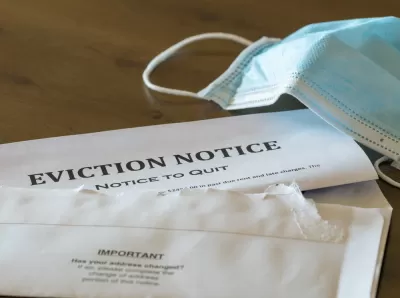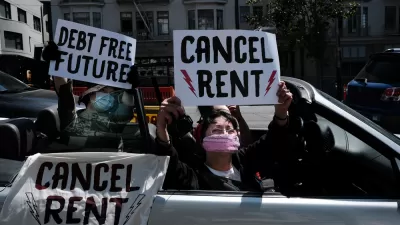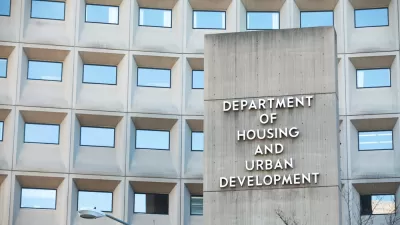Evictions incur immense costs for the public and nonprofit sector, according to new analysis from the Kinder Institute for Urban Research.

"Researchers at the Kinder Institute for Urban Research estimate that in Harris County, the public and private sectors spend $315,680,000 per year addressing the county’s uniquely large mass-eviction crisis," report Stephen Averill Sherman and Carlos Villegas. Those figures only include the costs already enumerated as the most obvious externalities of eviction, but many more expenses are likely hiding downstream of the eviction process, according to the article.
The article notes that evictions occur in "alarmingly high" numbers in Harris County, where Houston is located, according to data cited in the article from Eviction Lab. Therein lies both a problem, and potential solutions, according to Sherman and Villegas:
Houston is not an unusually poor major city, nor does Harris County have an unusually high share of renters (as seen in Table 1, it’s somewhere around the median for the top 10). Therefore, the eviction crisis seems endemic to discrete policies and legal practices within the state and region. But there are ways to address these challenges. Small, inexpensive policies, such as free legal assistance in eviction court, benefit not only the tenant but the bottom line for Harris County’s public coffers, shelters and charity medical providers.
Officials from Harris County and the city of Houston formed a Housing Stability Task Force in June, according to the article, with the Kinder Institute offering technical assistance, but some of the recommendations of the task force have yet to be implemented by county and city officials.
FULL STORY: Evictions cost Harris County over $315 million a year — that was before COVID-19

Montreal Mall to Become 6,000 Housing Units
Place Versailles will be transformed into a mixed-use complex over the next 25 years.

Planetizen Federal Action Tracker
A weekly monitor of how Trump’s orders and actions are impacting planners and planning in America.

DARTSpace Platform Streamlines Dallas TOD Application Process
The Dallas transit agency hopes a shorter permitting timeline will boost transit-oriented development around rail stations.

Congressman Proposes Bill to Rename DC Metro “Trump Train”
The Make Autorail Great Again Act would withhold federal funding to the system until the Washington Metropolitan Area Transit Authority (WMATA), rebrands as the Washington Metropolitan Authority for Greater Access (WMAGA).

Trump's “Able Bodied” Public Housing Limits Could Displace Over 300,000 New Yorkers
As part of 43% cut to federal rental assistance, Trump is proposing a two-year limit on public housing tenure for “able bodied adults.”

Nine Ways to Use Curb Space That Aren’t Parking
California’s new daylighting law bans parking within 20 feet of crosswalks. How can cities best use this space?
Urban Design for Planners 1: Software Tools
This six-course series explores essential urban design concepts using open source software and equips planners with the tools they need to participate fully in the urban design process.
Planning for Universal Design
Learn the tools for implementing Universal Design in planning regulations.
City of Mt Shasta
City of Camden Redevelopment Agency
City of Astoria
Transportation Research & Education Center (TREC) at Portland State University
City of Camden Redevelopment Agency
Municipality of Princeton (NJ)
Regional Transportation Commission of Southern Nevada





























